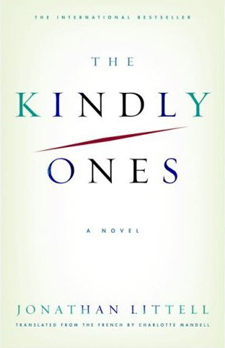 Just a brief round-up for anyone who’s missed the predictably and forcefully split critical reaction to Jonathan Littell’s The Kindly Ones, a nearly 1,000-page novel told from the decidedly unsentimental perspective of Max Aue, an SS officer during the Holocaust. Originally published in French, the book was a commercial and critical success. It’s too soon to judge its commercial success in America (it was published here last week), but it has people talking, which seems to be, for better or worse, its raison d’être.
Just a brief round-up for anyone who’s missed the predictably and forcefully split critical reaction to Jonathan Littell’s The Kindly Ones, a nearly 1,000-page novel told from the decidedly unsentimental perspective of Max Aue, an SS officer during the Holocaust. Originally published in French, the book was a commercial and critical success. It’s too soon to judge its commercial success in America (it was published here last week), but it has people talking, which seems to be, for better or worse, its raison d’être.
Michiko Kakutani, first out of the gate in the New York Times, snidely judged that the book’s champions “seem to have mistaken perversity for daring, pretension for ambition, an odious stunt for contrarian cleverness.”
Soon after, Michael Korda reviewed the book, and addressed its greatness as if answering a rhetorical question: “Yes, it’s a masterpiece,” he wrote, a work of “astonishing brutality, originality, and force.”
Somewhere between this dismissal and rave is Daniel Mendelsohn’s typically astute take in the New York Review of Books. Mendelsohn, renowned for his Classics background, brings a contextual knowledge to the novel that not many of its readers will. He argues that the book succeeds in “weaving together the dreadful and the mundane in an unsettlingly persuasive way.”
It’s that “mundane” that gives me (and Mendelsohn) pause. The Kindly Ones is not the first artistic endeavor to address the way that otherwise normal people can commit terrible acts. But from the reviews (including Korda’s rhapsody), it would seem that Aue is anything but normal, which could undermine the project. As Kakutani wrote:
Although Aue contends that he is “a man like other men,” “a man like you” and depicts himself as a cultivated intellectual who reads Flaubert and Kant, his story is hardly a case study in the banality of evil. Whereas the heroes of the play “Good” and the movie “Mephisto” were ordinary enough men who out of ambition or opportunism or weakness turned to the dark side and embraced the Nazi cause, Aue is clearly a deranged creature . . . Unable to understand Aue, much less sympathize with him, the reader is not goaded, as in the case of “Good” and “Mephisto,” to question his or her own capacity for moral compromise. Instead Mr. Littell simply gives us a monster talking at monstrous length about his monstrous deeds . . .
Or as Mendelsohn writes about Aue’s sadomasochistic, incestuous predilections:
. . . the problem, in the end, is that they make it harder and harder—and, finally, impossible—to see him as anything but, well, “inhuman,” a “monster,” precisely the kind of cliché of depravity that so many of this novel’s strongest passages successfully resist.

